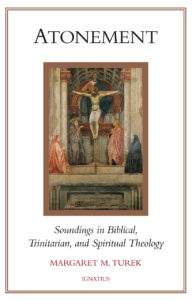Podcast: Play in new window | Download (Duration: 31:55 — 22.0MB) | Embed
Subscribe: Apple Podcasts | Spotify | Amazon Music | Android | Pandora | iHeartRadio | JioSaavn | Podchaser | Gaana | Podcast Index | Email | TuneIn | Deezer | Anghami | RSS | More

For Love of the Exile – Atonement: Soundings in Biblical, Trinitarian, and Spiritual Theology
Discerning Hearts presents a series of conversations between Dr. Margaret Turek and Evan Collins about her book, “Atonement: Soundings in Biblical, Trinitarian, and Spiritual Theology.”
 You can pick up a copy of the book here:
You can pick up a copy of the book here:
An excerpt from the book:
“After he sins, man tries to keep hidden the lie he is living. “At the beginning of the Letter to the Romans, Paul explicitly speaks of the pagans ‘not acknowledging’ God’s divinity; this failure to ac-know-ledge presupposes a prior (and persisting) ‘knowing.’ If evil is the lie, it necessarily implies that there must be a primary consciousness of what is fundamentally true, of what should be the case; and there must be a constant attempt to reassure oneself that it is not true and is not thecase.”147This evil and the lie that maintains it are what incur the judgment of God. God’s judgment on the corrupt hearts and works of the Gentiles reveals that they have in fact usurped the power of God, who is almighty goodness. From here we can understand Saint Paul’s assertion that all men, Gentiles and Jews alike, are “liars” (Rom 3:4), “under the domination of sin” (3:9); “all have sinned, and are deprived of the glory of God” (3:23). Nevertheless, Paul is aware of a significant difference between the sin of Gentiles and the sin of Jews. As Balthasar points out, “Sin arises in the case of Gentiles (in biblical terms, those who have not come into contact with God’s historical revelation) because, while they are bound to know God—this is a basic law applying to all men—they do not want to acknowledge him (Rom 1:18ff.).”148To be sure, the Gentiles exhibit an awareness of guilt and the need for atonement, but insofar as their efforts to atone for faults and evil deeds proceed solely from their own power, they repeat the basic pattern of man’s original sin. For even in dealing with their guilt, they regard themselves as empowered to draw divine power over to their side. Here again, fallen human freedom appears bent toward the “will to power” and acts as if the good to be gained from godly power (overcoming guilt) were in its power.149 Now, at this juncture, how are we to situate the Gentiles in relation to the vocation of Israel? Hardly anyone disputes the fact that the Old Testament connects the original “fall” of the human race with the divine mission of Abraham. God chooses Abraham to be the head of a new people, whose vocation is to become through obedience the authentic filial image of God in the world and thereby to renew human life in history. This renewed humanity is itself intended to be a gift, a source of blessing, for all the nations.”
Turek, Margaret. Atonement: Soundings in Biblical, Trinitarian, and Spiritual Theology (pp. 71-72). Ignatius Press. Kindle Edition.
From the book’s description:
“This book presents the chief insights concerning the mystery of atonement in the works of four theological guides: John Paul II, Joseph Ratzinger/Benedict XVI, Hans Urs von Balthasar, and Norbert Hoffmann.
The author argues for the central importance and perennial value of a theology of atonement, even as she explains the modern aversion to it. The book’s central aim is to deepen our understanding of the biblical claim that God shows himself to be love precisely by sending his Son as atonement. “In this is love: not that we loved God, but that he loved us and sent his Son as expiation for our sins” (1 Jn 4:10).
The book develops a compelling vision of atonement as a process that originates from and is engendered by God’s own power to love. This vision not only takes account of the gravity of sin and its consequences but also provides a clear illumination of the wholly gratuitous, radically forgiving, passionate and powerful nature of God’s redeeming love for mankind. Distinct from the majority of theological accounts of atonement, which focus almost exclusively on the role of Christ, this book highlights the role of God the Father in the atoning mission of the Son.”

